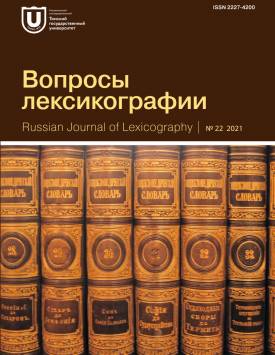Lexicographic and Discursive Representation of the Place-Name Chelyabinsk in English
The authors study the place-name “Chelyabinsk” from lexicographic and discursive perspectives employing definitional, cognitive-matrix, diachronic, cognitive and discursive, linguistic and cultural methods. The definitional method helps to explore the meanings of the place-name ‘Chelyabinsk’ recorded in English dictionaries. The authors compare and contrast the definitions, reveal semantic characteristics that constitute components of the place-name cognitive matrix in English, work out an integrated lexicographic definition of the place-name ‘Chelyabinsk’. The cognitive-matrix analysis is used to investigate the place-name’s representation in British media discourse of different time spans, namely, of the 19th, 20th, and 21st centuries. The diachronic analysis aims at studying the development, evolution, and change in the matrices over time. Linguistic and cultural methods are employed to demonstrate the functioning of the place-name ‘Chelyabinsk’ in British media discourse of a certain time span. The lexicographic study of the place-name ‘Chelyabinsk’ is carried out on the basis of British online dictionaries. The discursive characteristics of the place-name ‘Chelyabinsk’ are interpreted based on the material of the British Newspaper Archive and the British National Corpus. The integrated lexicographic description of the place-name ‘Chelyabinsk’ allowed the authors to single out the following cognitive domains: territory, political and economic peculiarities, culture, education, history. The cognitive matrix of 1894-1900 is represented by two domains: territory and political and economic peculiarities. The cognitive matrix of 1939-1945 is represented by three domains: political and economic peculiarities, culture, and territory. The cognitive matrix of 2013-2019 is represented by three domains: territory, sport, and political and economic peculiarities. The diachronic analysis of the place-name ‘Chelyabinsk’ in British media discourse shows that the foregrounding of archetypal and variable meanings depends on extra-linguistic factors, connected with a certain time span and correlated to a specific event in the history of the country, region or city. The findings obtained may serve as the basis for compiling the English-Russian dictionary of Chelyabinsk toponymy, which will manifest not only dictionary but also discursive meanings of place-names. This dictionary will contribute to linguistic and cultural studies, strengthen British-Russian relations, and mirror the place-name’s functioning in the foreign culture.
Keywords
lexicography, cognitive and discursive approach, place-name, Chelyabinsk, corpus, British discourseAuthors
| Name | Organization | |
| Solopova Olga A. | South Ural State University | o-solopova@bk.ru |
| Koshkarova Natalya N. | South Ural State University | nkoshka@rambler.ru |
References

Lexicographic and Discursive Representation of the Place-Name Chelyabinsk in English | Voprosy leksikografii – Russian Journal of Lexicography. 2021. № 22. DOI: 10.17223/22274200/22/6
